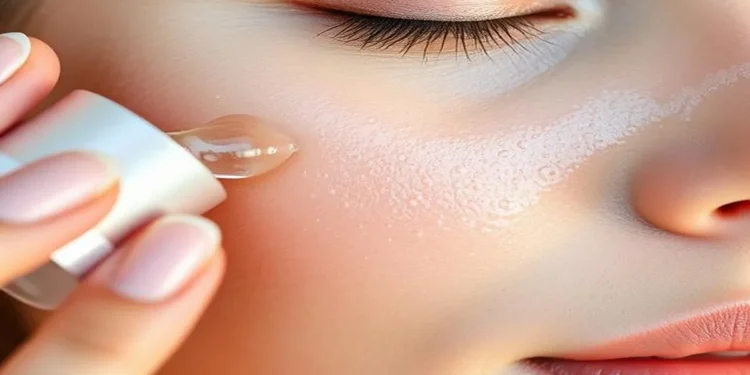Eczema, also known as atopic dermatitis, is a chronic skin condition that causes dry, inflamed, and itchy patches. Finding the right skincare products is crucial to managing flare-ups, and Hyaluronic Acid has become a popular ingredient in many skincare routines. But is it safe and beneficial for eczema-prone skin? In this article, we will dive into the benefits of Hyaluronic Acid for eczema, any potential risks, and how you can incorporate it into your skincare routine effectively.
What Is Hyaluronic Acid?
Hyaluronic Acid (HA) is a naturally occurring substance in the human body, primarily found in connective tissues, eyes, and skin. Known for its ability to attract moisture, Hyaluronic Acid can hold up to 1,000 times its weight in water, making it a powerful humectant in skincare.
When applied topically, Hyaluronic Acid helps hydrate the skin by drawing moisture from the environment into the skin’s surface. This makes it a go-to ingredient for treating dry skin and maintaining hydration, which is especially beneficial for those with eczema.

How Does Hyaluronic Acid Benefit Eczema-Prone Skin?
Eczema is characterized by a weakened skin barrier that leads to moisture loss and increased sensitivity. Hydration is key to managing eczema, and here’s how Hyaluronic Acid can help:
1. Deep Hydration
The primary benefit of Hyaluronic Acid is its ability to deliver intense hydration to the skin. For individuals with eczema, maintaining adequate moisture is essential to soothe dry patches and prevent flare-ups. By replenishing lost moisture, Hyaluronic Acid helps create a more balanced skin barrier, reducing dryness and irritation.
2. Gentle and Non-Irritating
Unlike other ingredients that may contain fragrances or oils, Hyaluronic Acid is lightweight and generally well-tolerated by sensitive skin, making it a great choice for people with eczema. Since it is naturally present in the skin, it’s unlikely to cause adverse reactions, which makes it an ideal option for managing eczema symptoms.
3. Supports Skin Barrier Repair
A weakened skin barrier in eczema leads to increased sensitivity and vulnerability to external irritants. By keeping the skin hydrated, Hyaluronic Acid plays a role in supporting the repair of the skin barrier. With a stronger barrier, the skin is less prone to environmental triggers like pollution, allergens, or harsh weather conditions, which can cause eczema flare-ups.
4. Non-Comedogenic
One of the concerns with using skincare products is whether they’ll clog pores, which can contribute to other skin issues like acne. Hyaluronic Acid is non-comedogenic, meaning it won’t block pores, making it a safe addition to your skincare routine even if you’re dealing with multiple skin concerns, including eczema and acne.
Potential Concerns: Does Hyaluronic Acid Have Any Risks for Eczema-Prone Skin?
While Hyaluronic Acid is widely regarded as safe, there are a few considerations to keep in mind:
1. Dry Environment
Hyaluronic Acid is a humectant, meaning it attracts moisture. In extremely dry climates or environments, it may draw moisture from deeper layers of the skin rather than from the air, leading to further dehydration. To counteract this, always follow up with a rich, occlusive moisturizer to lock in hydration after applying Hyaluronic Acid.
2. Product Formulation
While Hyaluronic Acid itself is gentle, many skincare products that contain it also include other ingredients like fragrances, alcohol, or preservatives, which could irritate eczema-prone skin. Look for fragrance-free and alcohol-free formulations to avoid potential irritants.
3. Concentration Levels
Hyaluronic Acid comes in various concentrations. While most people with eczema can tolerate lower concentrations (around 1%), high concentrations of HA (especially in serums) can cause some individuals to experience tightness or discomfort. Start with a lower concentration to assess your skin’s reaction.
How to Use Hyaluronic Acid for Eczema-Prone Skin
Incorporating Hyaluronic Acid into your skincare routine for eczema is easy, but there are a few key steps to maximize its benefits:
1. Start with Clean, Damp Skin
Begin with a gentle, non-stripping cleanser to remove any impurities without disturbing the skin barrier. Avoid products with harsh ingredients, such as sulfates, that can irritate eczema-prone skin. Apply Hyaluronic Acid while your skin is still damp to help it attract moisture more effectively.
2. Layer with a Rich Moisturizer
After applying Hyaluronic Acid, immediately follow up with a thick, emollient-rich moisturizer to seal in the hydration. This step is critical for eczema-prone skin, as it helps lock in the moisture that Hyaluronic Acid draws into the skin, preventing water loss and ensuring long-lasting hydration.
3. Use Consistently
For best results, apply Hyaluronic Acid consistently as part of your daily skincare routine. Hydrated skin is less likely to experience irritation, flaking, or inflammation.
4. Avoid Harsh Ingredients
Be mindful of layering Hyaluronic Acid with harsh actives, such as retinoids, exfoliating acids, or alcohol-based products, as they can increase irritation and disrupt the skin barrier. Always patch-test new products before applying them to your entire face.
Is Hyaluronic Acid Safe for Eczema-Prone Skin?
In summary, Hyaluronic Acid is generally safe and beneficial for eczema-prone skin, offering deep hydration, barrier support, and a gentle, non-irritating alternative to other skincare ingredients. However, it’s essential to use it properly by choosing fragrance-free products, applying it in a moisturizing routine, and considering the environment’s impact on your skin’s moisture retention.
If you’re still unsure whether Hyaluronic Acid is suitable for your eczema, consulting with a dermatologist can help you create a personalized skincare plan that best supports your skin’s health.
Final Thoughts
If you suffer from eczema and are seeking a hydrating solution that won’t irritate your skin, Hyaluronic Acid could be the answer. It’s a safe, highly effective ingredient that hydrates, repairs, and nourishes the skin, but make sure to follow up with a rich moisturizer and avoid products with harsh additives. By incorporating it correctly, you can keep your skin balanced and hydrated, reducing the likelihood of eczema flare-ups.
FAQs on Hyaluronic Acid for Eczema-Prone Skin
1. Is Hyaluronic Acid good for eczema?
Yes, Hyaluronic Acid is beneficial for eczema-prone skin. It helps hydrate and repair the skin barrier by drawing moisture into the skin, reducing dryness, irritation, and flakiness often associated with eczema.
2. Can Hyaluronic Acid cause eczema flare-ups?
While Hyaluronic Acid itself is gentle and non-irritating, products containing it may include other ingredients (such as fragrances or alcohol) that can trigger eczema flare-ups. Always opt for fragrance-free and alcohol-free formulations when using it on eczema-prone skin.
3. How does Hyaluronic Acid help with eczema?
Hyaluronic Acid works by deeply hydrating the skin and supporting the skin barrier, which is crucial for people with eczema. Well-hydrated skin is less prone to irritation and dryness, making it less likely to experience flare-ups.
4. Can I use Hyaluronic Acid every day for eczema?
Yes, Hyaluronic Acid can be used daily for eczema-prone skin, especially when applied with a thick moisturizer to lock in hydration. It’s best to use it consistently to maintain moisture balance and improve skin health.
5. Is Hyaluronic Acid safe for sensitive skin and eczema?
Hyaluronic Acid is generally safe for sensitive skin, including eczema-prone skin. Since it’s naturally found in the body and doesn’t typically cause irritation, it’s an excellent choice for soothing and moisturizing sensitive skin.
6. Can Hyaluronic Acid replace a moisturizer for eczema?
While Hyaluronic Acid is a powerful hydrating agent, it should not replace a moisturizer. It works best when layered under a moisturizer to lock in hydration and provide long-lasting moisture retention for eczema-prone skin.
7. How should I apply Hyaluronic Acid to eczema-prone skin?
For optimal results, apply Hyaluronic Acid to slightly damp skin to allow it to attract moisture. Follow up with a rich, emollient moisturizer to seal in hydration and protect the skin barrier from dehydration.
8. Can Hyaluronic Acid help with eczema scars?
Yes, Hyaluronic Acid may help improve the appearance of eczema scars by hydrating and promoting skin repair. However, it’s not a targeted treatment for scars, and combining it with other scar-healing products may provide more effective results.

